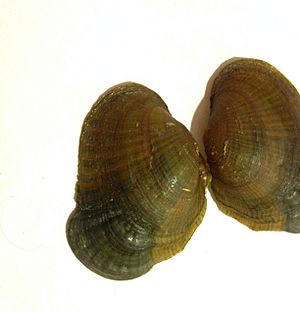Duck River dartersnapper facts for kids
Quick facts for kids Duck River dartersnapper |
|
|---|---|
 |
|
| Female specimen | |
| Conservation status | |
| Scientific classification | |
| Genus: |
Epioblasma
|
| Species: |
ahlstedti
|
The Epioblasma ahlstedti, also known as the Duck River dartersnapper, is a special type of freshwater mussel. Mussels are aquatic animals with two shells, called bivalves. They are part of a larger group of soft-bodied animals called mollusks. This particular mussel belongs to the family Unionidae, which are often called river mussels.
Contents
Discovering the Duck River Dartersnapper
Scientists officially described the Duck River dartersnapper in 2010. Before this, it was sometimes confused with a similar mussel, the Epioblasma capsaeformis. Both of these mussels are quite rare.
Where Does This Mussel Live?
The Duck River dartersnapper is found only in the southeastern United States. It lives in parts of Alabama and Tennessee. This mussel is endemic to the Tennessee River drainage. This means it naturally lives only in this specific river system.
Today, you can find this mussel mainly in the Duck River in Tennessee. It lives along about 30 miles of this river. The Duck River is known for having many different kinds of plants and animals.
Historically, this mussel also lived in other places. Old museum records show it was once found in the Buffalo River. It also lived in the main part of the Tennessee River near Muscle Shoals and in Shoal Creek, Alabama.
Why Is This Mussel Important?
Like many freshwater mussels, the Duck River dartersnapper is facing big challenges. Its natural home, or habitat, has been greatly reduced. This is why it is now considered a very rare species globally. Protecting these mussels helps keep our rivers healthy.
Images for kids



